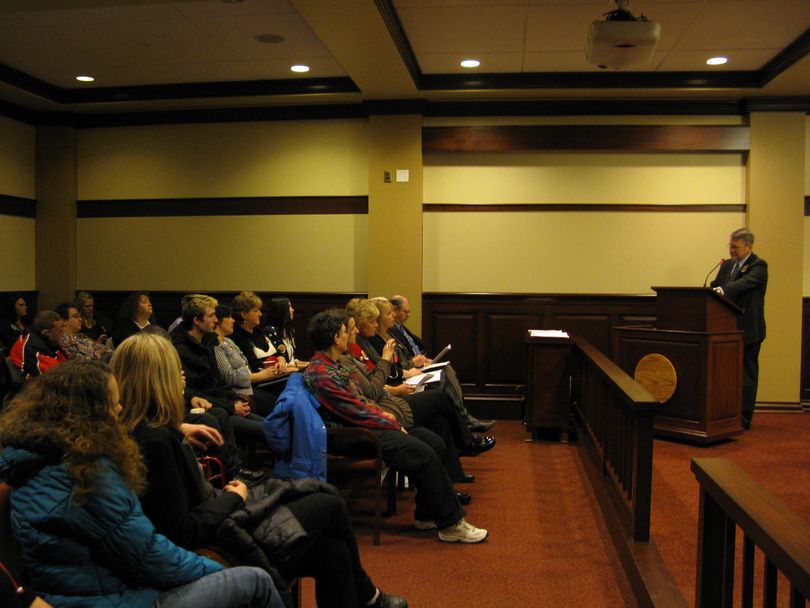Advocates outline a plan to fix flaws, restore cuts to Medicaid…

Numerous people with disabilities, advocates and care providers gathered in the Statehouse today for an advocacy day, with displays in the rotunda and more. At a news conference this morning, advocates announced “Steps to Rebuild Medicaid,” a plan that taps funds identified in former chief state economist Mike Ferguson’s proposed alternative budget for next year to restore cuts to Medicaid, and identifies priorities for how to fix flaws in the current system.
“This is not a question of resources, it is a question of will,” Ferguson said. The advocates called for building an effective community-based mental health system in Idaho; keying services for children with disabilities to their needs, rather than an arbitrary budget amount; and paying providers “a fair and equitable reimbursement rate to ensure quality, sustainable services.”
“Every study conducted in Idaho has reported a mental health system which is fragmented, and concentrated on involuntary hospitalization with a huge percentage of people with mental illness being held in jails or prison,” said Jim Baugh, executive director of Disability Rights Idaho. “From 2009 to 2011 in response to the great recession, Idaho decimated its meager array of services for people with serious and persistent mental illness.” Baugh said the cuts have gone so far that “parents are now advised to have their children charged with a crime so that they have the ability to get priority for mental health services.”
He said the Department of Health & Welfare closed nine of its satellite mental health clinics from 2009 to 2011, cutting hundreds of patients off from services from ACT teams, which stands for Assertive Community Treatment; the teams provide long-term assistance to people with persistent mental illness to help them avoid going into crisis. “$5.6 million would restore seven ACT teams and provide ACT to 700 people with serious and persistent mental illness,” Baugh said. “Instead of the three behavioral health crisis centers proposed by the governor, Idaho could have seven centers serving all geographic regions.”
Angela Lindig, head of Idaho Parents Unlimited, said children’s developmental disabilities services have been slashed. Marilyn Sword, former executive director of the Idaho Council on Developmental Disabilities, said, “Unfortunately, people with disabilities have tried to make do with less and less. … As a result of losing these services, individuals cannot afford to take the responsible, preventative route but are forced to forgo treatment until a crisis occurs. Then it’s the emergency room or a jail that provides the intervention at a much more costly price, and we all pay for this, fiscally and in human terms.”
Katherine Hansen of Community Partnerships of Idaho said a 2007 state study found that community providers were being paid far less than the cost of their services; in 2009, Health & Welfare asked the Legislature to cover half the $22 million gap that was identified. “The increase was never funded,” she said. “In fact, Medicaid has been cut further.”
Ferguson said his budget proposal, which would shift priorities from tax cuts and increasing reserves to school funding, employee pay raises and restoring Medicaid, shows the state has the money to address those priorities. “There are substantial ongoing revenues available that are not being utilized in the executive budget,” he said.
Baugh said he’s encouraged that the Legislature already is moving to restore adult non-emergency dental coverage under Medicaid that was cut in 2011, and by legislation introduced today to restore employment supports for developmentally disabled people, a 2011 cut that removed the ability of many of those clients to work. “I think the Legislature does have the desire to go back and fix some of the unintended consequences of what happened in ’11 with the $35 million cut,” he said. With the approach in Ferguson’s alternative budget, he said. “We could make bigger steps.”
